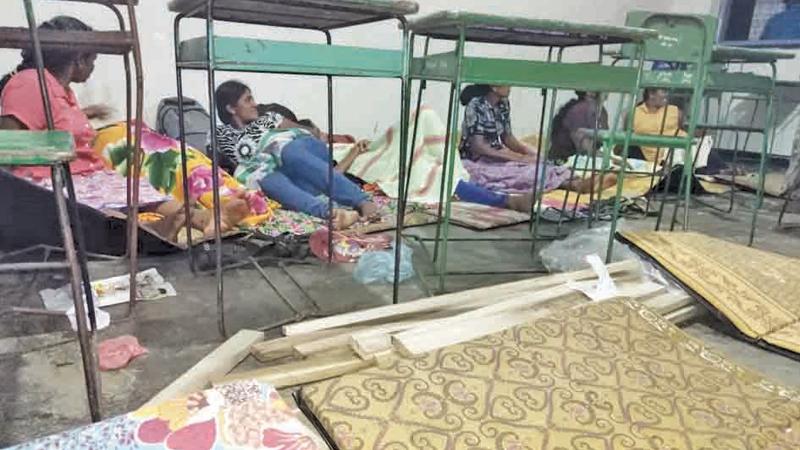
It was a long ride from Anuradhapura to Colombo. Menaka Ekanayaka, 41, an athlete eager to compete at the para games organised by Social Services Department left her hometown as did 69 others at around 3.00 p.m. on Monday, November 25.
It was about 10 p.m. when they finally arrived exhausted and sleepy in Colombo and were shown into a classroom at Vijayaba Maha Vidyalaya in Grandpass. There the sportspersons, who had various kinds of disabilities and their family members, were told to spend the night before the next day’s event at the Sugathadasa National Stadium.
“As soon as I walked into the room I sat down on a chair in disbelief. The room smelt very bad. I couldn’t understand why we were treated so badly,” Ekanayake said.
The classroom still had desks and chairs and in one corner there were food packets with rotting food that filled the room with a strong stench. Water flowed through the room, and there was no broom to sweep the floor. The athletes and their families were given thin mattresses to sleep on.
Ekanayake remembers how badly she wanted to go back home. But the driver had had a long day and was already asleep and everyone decided to stay despite the harrowing conditions.
“Altogether there were about 300 who stayed in the school that night. Most of us ate sitting on the floor,” she recalled.
The next morning things got even worse. There were only four toilets which all of them had to share. Ekanayake said most of them could not even have a bath. She only had a bath after going back home.
She also said that some athletes did not compete in some events because they were tired and didn’t get a chance to freshen up.
During lunchtime they were all given rice packets. “But the rice was spoilt. None of us had lunch that day. We only had the bun and soft drink they gave us at tea time,” Ekanayake said.
Appalling
Responding to a tweet that revealed the horror the para-athletes were made to go through, parliamentarian, Namal Rajapaksa said, “This is appalling. Will bring this to the attention of the Ministry of Sports immediately. There is a significant need for infrastructure development in Sri Lanka’s sports sector.”
According to statistics given by an official at the Department of Sports Development there are about 400 who compete at the annual National Para Games. Most of them are soldiers who were wounded in the war, but now it is changing. More non-military sportspersons are showing interest in the para games.
However, para-athlete Kanchana Pradeepa de Silva, who has been competing in events since 2011, said the journey is far from comfortable.
“We don’t get enough disability-friendly facilities. Most travel from very far to Colombo to compete. It is not easy to travel long distances with a disability,” she said.
The case is especially bad for those who need to use wheelchairs. Most of these athletes need commodes, but they don’t always find them at places they are made to stay nor in playgrounds. This was also the case at Vijayaba Maha Vidyalaya.
“We particularly asked for commode facilities from the officials of the Social Services Department before arriving. We were told that officials will take care of us. They didn’t,” Ekanayake from Anuradhapura said.
The 2017-2021 National Human Rights Action Plan states that the Ministry of Sports and Ministry of Education is set to launch sports, educational and training curricula in all schools. This includes the adaptation of modules on disability sport. But the question is whether the country has enough disability-friendly facilities and equipment to train budding athletes.
Equipment
A Project Officer at the National Sports Department and a member of the National Paralympic Committee, Jansz Dissanayake said there is a dearth of such equipment.
“These athletes also need nutritious food. It is not easy to engage in sports activities with a disability,” Dissanayake, who is also a former coach, said.
Most athletes try to find their own equipment, in some cases their friends in foreign countries gift equipment but sometimes they do more harm than good because they do not fit well. Dissanayake said blades used for running, most commonly gifted, are still not available in the country. There are many talented para-athletes in the country, Dissanayake said, but they need help to train and perfect themselves.
“In other countries these athletes share a common place with athletes with no disabilities. We are gradually becoming a disability-friendly nation but we are still not at a professional level,” he added.
